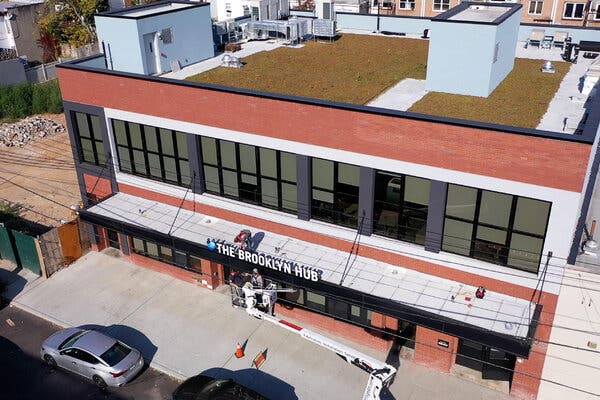by James Barron
Nov. 20, 2024
More than 1 in 4 households in Borough Park and Bensonhurst, Brooklyn, are below the poverty line. Inflation has made it especially difficult to put food on the table, with surveys suggesting that hard-pressed households are buying less meat and fish and fewer eggs — and more rice and other “filler” foods.
A food pantry in a social services center that is opening today, on 60th Street between 12th and 13th Avenues, is using a novel approach to providing staples. It has an online ordering system, “as opposed to a standard pantry, where you’d stand on line in a very undignified way and get a random box of food you might or might not like,” said Eric Goldstein, the chief executive of the UJA-Federation of New York, which built the $12.5 million center.
Alexandra Roth-Kahn, a managing director of the UJA-Federation, said the ordering system was “almost like FreshDirect”: It will let people select the food they want, ideally meaning that less will go to waste.
“In the old days,” Roth-Kahn said, “we used to see products that were discarded,” because recipients could not see what was in their packages ahead of time, and those who had food allergies, for example, could not always eat what they were given.
Goldstein said the ordering system had been configured to incentivize healthy choices by awarding points. The points are like calories — a user spends fewer points on fresh produce, protein and dairy products than on processed items. “If you want to have cookies, there are cookies,” he said, “but fruits are worth fewer points than cookies.”
Roth-Kahn said the system was tied to a warehouse in Canarsie, Brooklyn, that is run by the Met Council on Jewish Poverty, a nonprofit that developed the online system, called Market by Met Council, and will manage the new center in Brooklyn. David Greenfield, the Met Council’s chief executive, said it was already using online ordering at 20 other sites in the city and reached 100,000 orders last week.
Roth-Kahn said the online system would let users schedule pickup times, “so they’re not missing work.”
The new center is not just a food pantry. Goldstein said that users could also go there to find out whether they are eligible for government benefits and emergency cash assistance, and that there would be support for victims of domestic violence, Ukrainian refugees and Holocaust survivors.
The idea for the center came when the UJA-Federation was planning for its 100th anniversary in 2017. It built a hub in Queens that opened in 2021 and wanted to build one in Brooklyn as well. Greenfield, of the Met Council, worked with the group to find a location.
“It took us almost two years to scout out that actual spot,” he said, noting that 60th Street is “the actual border” between Bensonhurst — which has a large immigrant community that includes Ukrainian refugees and Asian Americans — and Borough Park, with its Orthodox Jewish residents.
A person might initially come to the center for food, Goldstein said, but once there, could take advantage of services like job counseling that could point to a higher-paying job. “People who come in for the food after seven or eight months no longer come in for the food,” he said. “The results in Queens have shown us this is an effective model.”

